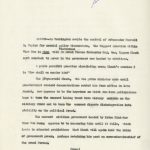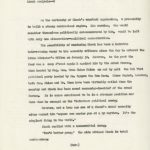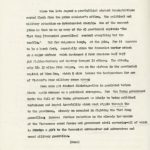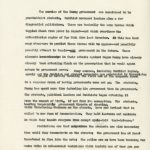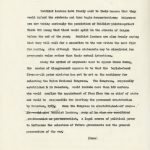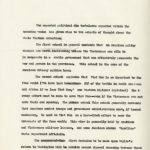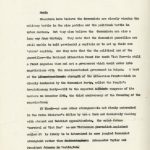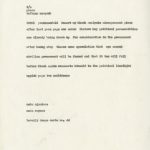1964, November 19, “Major General Nguyen Khanh Comeback to Power”
deepe
khanh analysis–1 [Sent?] Nov. 19
SAIGON–As Washington awaits the arrival of Ambassador Maxwell. D. Taylor for crucial policy discussions, the biggest question within Viet Nam is when willAmVietnamese Armed Forces Commander Maj. Gen. Nguyen Khanh comb comeback to power in the government now headed by civilians.
A parae parallel question circulating among Khanh‘s enemies i is “How shall we murder him?”
The 37-year-old Khanh, who was prime minister unts until pro-Buddhist student demonstrations routed him from office in late August, now appears to be the keystone on which American poliycmakers hope to turn the current losing trend into victory and tom on the military front and to turn the current disentedisintegration into stability on the political front.
The current civilian government headed by Prime Minister Tran Van Huong appears to be measuring time until it falls, which leads to educated predictions thatKhanh will again hold the reins of government power, perhaps retaining his post as commander-in-chief of the Armed Forces.
(More)
deepe
khanh analysis–2
As the certainty of Khanh‘s comeback approaches, a presumably to build a strong centralized regime, his enemies, who would consider themselves politically out-maneuvered by him, would be left with only one alternative–political assassination.
The possibility of murdering Khanh has been a hair-tin hair-raising worry to his security officers since the day he entered the Prime Minister’s Office on January 30. However, in the past the fear was a coup d’etat again h against him by the armed fores, then headed by Maj. Gen. Tran Thein Khiem or and by poli the Dai Vietpolitical party headed by Dr. Nguyen Toa Ton Hoan. Since August, however, both Gen. Khiem and Dr. Hoan have been virtually exiled from the country andKhanh has been named commander-in-chief of the armed forces. He is conse considered to be in a stronger position now than when he emerged on the Vietnamese political scene.
“However, not o long ago one of k Khanh‘s chief security aides warned him “anyone can murder you at any time. IT’s the simplest thing in the world.”
Khanh replied with a noncommittal shrug.
“You’d better pray,” the aide advised Khanh in total seriousness.
(More)
deepe
khanh analysis–3
Since the late Augustpro-Buddhist student demonstrations routed Khanh from the prime minister’s office, the political and military situation as deteriorated sharply. One of the current jokes is that in ma ny many of the 45 provincial capitals “The Viet Cong (Communist guerrillas) control everythign but the traffic.” But few Saigonese laugh, at the joke, for it appears to be a harsh fact, especially since the Communist mortar attack on a major aribase which destroyed 4 four American B-47 B-57 jet fighter-bombers and destroy damaged 14 others. The attack, only l8x 35 miles from Saigon, was on the airbase in the rovincial capital ofBien Hoa, which l also houses the headquarters for one of Vietnam‘s four military corps areas.
Even more p91 distinct disintegration is predicted before Khanh again emerges as a political strongman. For the Huong government iand the fall of the Huonggovernment is likely to bring political turbulence and instal instability which must ripple through tho to the provinces, already em enmeshed in fighting the Viet Cong guerrillas; increas further reduction in the already low morale of the Vietnamese armed forces and government civil servants.–all of which is llandym a gift to the Communist subversivew and subversives and armed military guerrillas.
(More)
deepe
khanh analysis–4
The enemies of the Huong government are considered to be pro-Buddhist students, Buddhist movement leaders plus a few disgruntled politicians. These are basically the same forces which toppled Khanh from power in August–and which overthroew the authoritarian regime of Ngo Dinh Diem last November. It This has lead many observers to predict these forces will hs oppose–and possibily possibly attempt to topple–any government in the future. These elements have already in their attacks against Hugon Huong have already already been attacking Khanh on the presumption that he would again return to government power. many sources, including Buddhist laymen, openly say the Buddhist and student movements are penetrated by Communists.
Saigon is already watching the first act of the suspense drama in a suspense drama of having governments come and go. The students, Huong has spent more time defending than his government than in government. The students, political leaders and Buddhists began attacking it from the moment of birth, if not from its conception. The students, while threatening violence on the streets,heeding temporarily government threats of shooting, have now devised what is called “a new form of demonstration. They hold lectures and seminars in which they insult everyone from except cyclo-driv taxi-drivers.”
Predictions are that any time the students are also measuring timeuntil they demonstrate on the streets; the government has at least threatened to fire into the mobs; the police are so have been training for weeks withx in mob-control techniques which include use of tear gua gas and long bamboo wi whips to be pounded on the legs of schoolboys. If none of these deter the students, the only alternative considered to be left for the government is repression and bloodshed. (Mo0re)
deepe
khanh analysis–5
Buddhist leaders have freely said to their masses that they would defend the students and then begin demonstrations; Saigonese are now taking seriously the prediction of [the persuasive?] Buddhist politio-priest Thich Tri Quang that blood would spillflow on the streets of Saigon before the end of the year. Buddhist leaders are also freely saying that they will call for a ceasefire tot he war within the next frew few months, alre although these statements mayb be circulated for propaganda value rather thant heir actual intentions.
Among the myriad of arguments used to oppose Hunon Huong, the center of disagreement appears to be that the boyish-faced 63-year-old prime minister has yet to set up the machinery for selecting the Naton National Congress. The Congress, supposedly established b in December, would include more than 100 members who would confirm the appointment of Phan Khac Suu as chief of state and would be responsible for drafting the permanent constitution by November, 1965,. Once the Congress is ewestablished–if ever–it would giveCommunist Buddhist leaders, many of ho whom are considered pro-Communist or pro-neutralist,would be given a legal source of political power to influence the selection of future governments and the general prosecution of the war.
(More)
deepe
khanh analysis–6
The expected political dis turbulence expected within the upcoming weeks has given rise to two schools of thought abut the whole Vietnam situation.
The first school in general contends that no American policy changes are worth instutiting[will work?] unless the Vietnamese are able to co cooperate in a stable government that can effectively prosecute the war and govern in the provinces. This school is the core of the American Embassy opinion here.
the second school explains that Viet Nam is so important tot he free world (“We have lost have themm 20% of the battle in South American and Africa if we loseViet Nam,” one Western diplomat explained) tha t every effort must be made to save Viet Nam–even if the Vietnamese can not save their own country. The prodem school This school generally contends that American combat troops and government administrators must, if deemed necessary, be sent to Viet Nam as a last-ditch effort to save the interests of the free world. This view is generally held by American and Vietnamese military leaders, and some American state“hardline” State Department officials.
The concern of the first decision to be made upon Taylor‘s return to Washington will be revolve around choosei choosing between these two schools of thought.
more)
deepe
khanh analysis–67
While
Observers here believe the Communists are clearly winning the military battle in the rice paddies and the political battle in the urban centers. But they also believe the Communists are also a long way from victory. They note that the Communist guerrillas are still unable to hold provincial x capitals or to set up their own “state” capital. And they note that the political arm of the guerrillas–the National Liberation Front for South Viet Nam–is still a front organiza tion and not a government which could enter into negotiations with the American-backed government in Saigon. A test of the Liberation Front strength and limitations of the Liberation Front–which is clearly dominated by the Communist Party, called the People’s Revolutionary Party–will be the expected le Third congress of its members on December 20th, the third anniversary of the founding of the organization.
If Khanh–or some other strongman–is not firmly entrenched in the Prime Minister’s Office by ten a then and decisively dealing with student and Buddhist oppositionists, the solut futureeventual “survival of Viet Nam” as one Vietnamese journalist explained called it is likely to be determined in some jungled Communist stronghold rather than in Washington Ambassador Taylor and President Johnson in Washington.
-30-
t/a
press
tribune newyork
20201 prorosenfeld insert my khanh analysis airexpressed piece after last para page one colon listsve key political personalities are already being drawn up for consideration in the government after huong stop theres some speculation that aye second civilian government will be formed and that it too will fall before khanhagain reasserts himself in the political limelight uppick page two enditdeepe
mots ajoutes: 4
mots rayes:
Beverly Deepe
beverly deepe carte no. 44
Read Previous Article: 1964, November 12, “Counter-Subversive Wars”
Read Next Article: 1964, November 24, “Overtures to Send 5,000 Filipino Troops”

